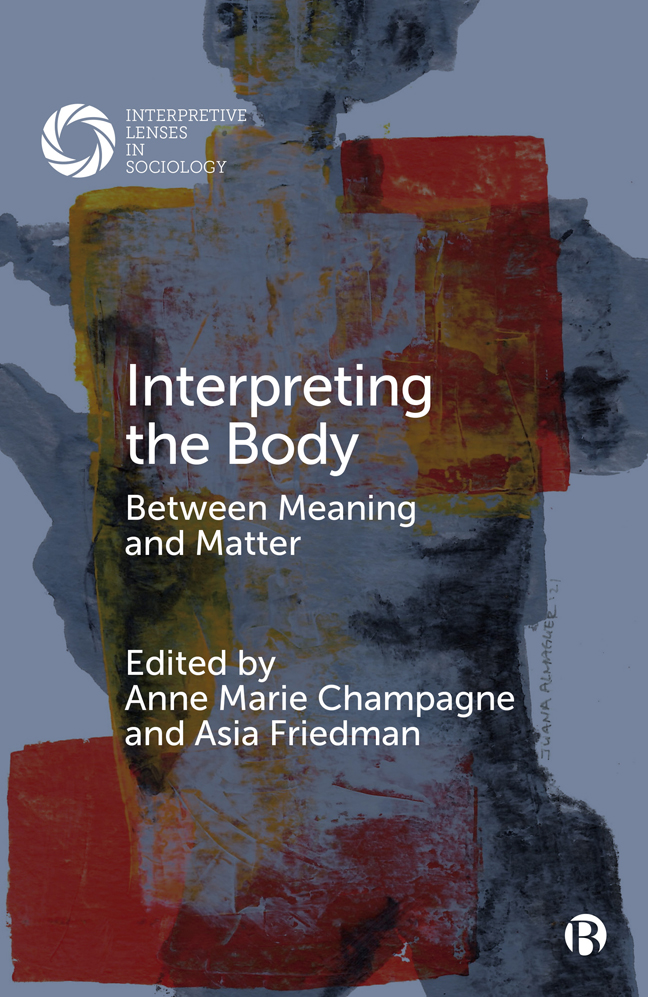Book contents
- Frontmatter
- Dedication
- Contents
- Series Editors’ Preface: Interpretive Lenses in Sociology—On the Multidimensional Foundations of Meaning in Social Life
- Notes on Contributors
- Preface and Acknowledgments
- Introduction: Between Meaning and Matter
- 1 Toward a Strong Cultural Sociology of the Body and Embodiment
- 2 Thinking the Molecular
- 3 Interpreting Africa's Seselelãme: Bodily Ways of Knowing in a Globalized World
- 4 Gender on the Post-Colony: Phenomenology, Race, and the Body in Nervous Conditions
- 5 Reinterpreting Male Bodies and Health in Crisis Times: From “Obesity” to Bigger Matters
- 6 Beauty, Breasts, and Meaning after Mastectomy
- 7 “You Are Not the Body”: (Re)Interpreting the Body in and through Integral Yoga
- 8 Black Girls’ Bodies and Belonging in the Classroom
- 9 Embodied Vulnerability and Sensemaking with Solidarity Activists
- 10 Our Bodies, Our Disciplines, Our Selves
- Index
8 - Black Girls’ Bodies and Belonging in the Classroom
Published online by Cambridge University Press: 23 January 2024
- Frontmatter
- Dedication
- Contents
- Series Editors’ Preface: Interpretive Lenses in Sociology—On the Multidimensional Foundations of Meaning in Social Life
- Notes on Contributors
- Preface and Acknowledgments
- Introduction: Between Meaning and Matter
- 1 Toward a Strong Cultural Sociology of the Body and Embodiment
- 2 Thinking the Molecular
- 3 Interpreting Africa's Seselelãme: Bodily Ways of Knowing in a Globalized World
- 4 Gender on the Post-Colony: Phenomenology, Race, and the Body in Nervous Conditions
- 5 Reinterpreting Male Bodies and Health in Crisis Times: From “Obesity” to Bigger Matters
- 6 Beauty, Breasts, and Meaning after Mastectomy
- 7 “You Are Not the Body”: (Re)Interpreting the Body in and through Integral Yoga
- 8 Black Girls’ Bodies and Belonging in the Classroom
- 9 Embodied Vulnerability and Sensemaking with Solidarity Activists
- 10 Our Bodies, Our Disciplines, Our Selves
- Index
Summary
Bodies carry us through the world and influence all our social interactions (Story, 2010). Our experiences are mitigated by the politics surrounding our corporeal form. For example, in the shared space of a train, surrounded by strangers, some bodies are marked as outsiders because of skin color, spoken language, clothing, or smell—characteristics to which passengers may impute abject meanings, such as disgust (Miller, 1997), which then serve as personal moral justifications for avoiding bodily interaction (Ahmed, 2000). Black girls experience a form of this outsider status in classrooms. They are cast in the margins of educational spaces based on multiple factors related to their bodies: Black girls experience subjugation for their race, in their Blackness; for their gender, in their girlness; and for their developmental status, in their youthfulness. Many adults view and treat Black girls as older and more mature than their actual age (Epstein et al, 2017). Relatedly, Black girls receive more referrals, are punished more harshly, and are more likely to be removed from school than their non-Black classmates for the same infractions (Blake et al, 2011; Morris and Perry, 2017; Gibson et al, 2019). What is more, they are disciplined more frequently for subjective actions, such as disobedience, than objective violations, such as drug or alcohol possession (Annamma et al, 2016). The misogynoir of these intersectional subjugations—racism, sexism, and ageism—is linked to racial disparities in how social actors interpret Black girls’ bodies. In school settings, this misogynoir carries negative implications for Black girls’ sense of belonging, exacerbating disparities in educational equality, widening opportunity gaps, and reinforcing performance variances around race (Gregory et al, 2010). Previous research has found, for instance, that experiences with school discipline and constant surveillance lead Black girls to feel devalued in schools (Wun, 2016a). Beyond broader beliefs about the value of their lives, these embodied intersectional subjugations impede healthy identity development and academic performance among Black girls (Hines-Datiri and Carter Andrews, 2017). They also center Black girls’ educational lives around the burden of hypersurveillance, exclusionary notions of femininity, and relationships characterized by antiblackness (Carter Andrews et al, 2019).
- Type
- Chapter
- Information
- Interpreting the BodyBetween Meaning and Matter, pp. 178 - 201Publisher: Bristol University PressPrint publication year: 2023



